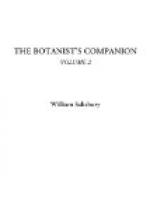382. Ranunculus Flammula. Small spearwort.—It has been lately discovered that this plant possesses very active powers as an emetic, and it is supposed to be useful in some cases of vegetable poisons.
383. Rhamnus Frangula. The black or berry-bearing Alder. Its Bark.—The internal bark of the trunk or root of the tree, given to the quantity of a dram, purges violently, occasioning gripes, nausea, and vomiting. These may be in good measure prevented by the addition of aromatics; but we have plenty of safer and less precarious purgatives.
384. Rhus coriaria. Elm-leaved Sumach.—Both the leaves and berries have been employed in medicine; but the former are more astringent and tonic, and have been long in common use, though at present discarded from the Pharmacopoeias.
385. Ribes nigrum.—The juice of black currants boiled up with sugar to a jelly, is an excellent remedy against sore throats.
386. Rumex Hydrolapathum. The great water dock.—The leaves of the docks gently loosen the belly, and have sometimes been made ingredients in decoctions for removing a costive habit. The roots, in conjunction with other medicines, are celebrated for the cure of scorbutic and cutaneous disorders, for which the following receipt is given by Lewis.
Six ounces of the roots of the water dock, with two of saffron; and of mace, cinnamon, gentian root, liquorice root, and black pepper, each three ounces, (or, where the pepper is improper, six ounces of liquorice,) are to be reduced into coarse powder, and put into a mixture of two gallons of wine, with half a gallon of strong vinegar, and the yolks of three egs; and the whole digested, with a moderate warmth, for three days, in a glazed vessel close stopped: from three to six ounces of this liquor are to be taken every morning on an empty stomach, for fourteen or twenty days, or longer.
387. Salvia Sclarea. Garden Clary. The Leaves and Seeds.—These have a warm, bitterish, pungent taste; and a strong, not very agreeable smell: the touch discovers in the leaves a large quantity of glutinous or resinous matter. They are principally recommended in female weaknesses, in hysteric disorders, and in flatulent colics.
388. Sambucus Ebulus. Dwarf elder, or DANEWORT. The Root, Bark, and Leaves.—These have a nauseous, sharp, bitter taste, and a kind of acrid ungrateful smell: they are all strong cathartics, and as such are recommended in dropsies, and other cases where medicines of that kind are indicated. The bark of the root is said to be strongest: the leaves the weakest. But they are all too churlish medicines for general use: they sometimes evacuate violently upwards, almost always nauseate the stomach, and occasion great uneasiness of the




